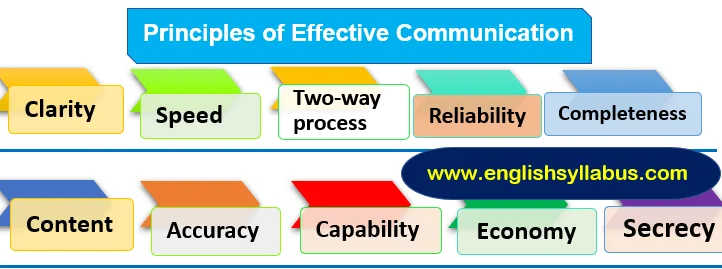Introduction to the Principles of Communication
1. Clarity of message
“The soul of communication is clarity of ideas.” The beauty of a good message lies in its clarity. It means; ‘be to the point and never beat about the bush’. If your receiver is feeling it easier to understand your message and finds out the core, it means the sender is clear about what he wants to convey. It’s the most credible part of effective functions of communication.
2. Speed
A strong communication system ensures the delivery of messages quickly. So, the time it takes to send a message to its intended recipient, and the speed of the communication channel should be examined in light of the message’s urgency. It is an issue for the organization if the communication is not delivered on time.
3. Two-way process
Communication is the key process that goes on both sides in which the sender receives feedback from the receiver. In other words, it is an interdependent process based on mutual participation. So, no one alone can communicate anything without others’ responses.
4. Reliability
Communication demands mutual trust, and credibility. Whereas all and sundry cannot build this kind of feasible environment, but an expert. If the recipient has faith in the sender, he must also trust the source’s knowledge of the subject. Reliability creates easiness to flourish communication effectively.
5. Completeness
As we all know miscommunication occurs only due to incomplete transmission of messages. So, our message should be, clear, complete, and relevant to the point. Each part of a message becomes unique with completeness.
6. Content
The information must be valuable to the recipient and fit with his personal beliefs. It has to be significant to him. People, on the whole, choose the things or information that offer them the most benefits. The audience’s reaction is determined by the content.
7. Accuracy
Accuracy saves us from vague information, misunderstanding, and confusion. Therefore, it is one of the fundamental principles of communication to be accurate. And, the right medium of communication can only ensure a higher level of accuracy.
8. Capability
Communication should always be level-appropriate for the audience; neither high nor low. So, it becomes more effective when the recipients feel easy to understand. So, the capability of the audience must be considered in this regard along with the medium of instruction.
9. Economy
The economy is a core part of any organization, but it’s not as important as communication itself. The medium of communication should be affordable and reliable. However, it’s the last part that we give less importance to.
10. Secrecy
There should be no information leaking and the communication mechanism should assure secrecy. When messages are sensitive, it becomes even more important to be on the safe side.

